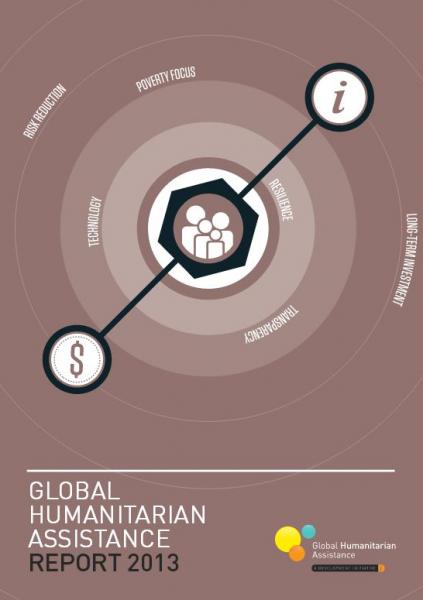You are here
 globalhumanitarianassistance.org - July 17, 2013
globalhumanitarianassistance.org - July 17, 2013
‘Year of perpetual crises’ exposes chronic poverty and vulnerability
Geneva: The Global Humanitarian Assistance (GHA) report 2013, released today by Development Initiatives at the UN’s ECOSOC meeting, highlights the absence of any ‘mega-disasters’ [1] in 2012 but reveals the perpetual vulnerability of the poorest people in developing countries and their persistent exposure to crises.
The GHA report, the most comprehensive annual review of humanitarian financing, highlights the shocking death toll of the hunger crisis in Somalia, with 257,000 people (or 4.6% of the population) estimated to have died between 2010 and 2012.
Judith Randel, Executive Director of Development Initiatives, said:“The data shows that the response to slow-onset crises such as Somalia is often late, resulting in huge numbers of unnecessary deaths. By intervening earlier, as well as investing in mechanisms that reduce risk, donors could save more lives and protect more livelihoods - probably at lower cost.”
The latest UN appeal for Somalia has a three-year planning horizon from 2013-17: a major advance on the previous one-year appeals, and a step towards recognition that many humanitarian crises are just acute manifestations of chronic problems – and should be funded and managed accordingly.
The report also details how the human impact of the crisis in Syria increased exponentially in 2013. At the time of writing approximately 6.8m people were in need, there were more than 1.6m refugees, and 4.25m people were internally displaced. The 2013 UN appeals for Syria stood at a record total of US$5.2bn. [2]
Among the report’s key findings are:
- Global humanitarian response fell by 8% from US$19.4bn in 2011 to US$17.9bn in 2012.
- In 2012, 76 million people were targeted by the UN as needing humanitarian assistance – compared with 93 million people in 2011.
- The proportion of total UN humanitarian appeals met in 2012 (62.7%) was the lowest for a decade. This funding gap has increased year on year since 2007.
- The US remains by far the biggest donor by volume (US$3.8bn or 0.02% of GNI), while Luxembourg and Sweden gave the most as a percentage of national income (0.16% of GNI or US$74m and 0.14% of GNI or US$784m respectively).
- Turkey was the fourth-largest donor of humanitarian assistance in 2012 (over US$1bn or 0.13% of GNI). This illustrates the rising significance of ‘emerging’ donors but also more comprehensive reporting of humanitarian assistance from a much wider range of providers.
- Pakistan, Somalia and the West Bank and Gaza Strip received the most humanitarian assistance in 2011 (the latest year for which figures exist). Pakistan received US$1.4bn, Somalia US$1.1bn, and the West Bank & Gaza Strip US$849m.
Many of the poorest countries provide humanitarian assistance by hosting refugees – for example Pakistan hosted over 1.7m refugees in 2011, Kenya 567,000 and Chad 367,000. The report details a number of positive reforms that are underway to make humanitarian aid more effective including putting in place more cash transfer schemes, placing a focus on resilience, enhancing access to information, and increasing investment in disaster prevention and preparedness.
The key recommendations to donors include providing more predictable multi-year funding for chronic crises; spending more on disaster preparation and preparedness in close collaboration with governments of affected countries (still only 4.7% of the total in 2011); focusing on early response and the interconnectedness of risk; and promoting access to information and better reporting.
Randel: “Humanitarian assistance is often seen as a short-term intervention with short planning cycles. But poverty will not be ended without improving underlying security and increasing resilience to crises. Humanitarian assistance needs to evolve to be strategically aligned and coordinated with overall development assistance and other resources.”
Ends
Contacts:
Ruth Harwood, T: 01179 272 505 M: 07896 442 055 E: ***@***.***
Tom Berry, T: 01179 272 505 M: 07891 932726 E: ***@***.***
For editors
1] By ‘mega-disasters’ we mean natural disasters with high numbers of fatalities, such as the Japanese tsunami in 2011 or the Haiti earthquake in 2010.
2] Latest Syria appeal figures: http://bit.ly/10AXfbm (source: UN Financial Tracking Service); Latest Syria refugee figures: http://bit.ly/HqwSM3 (source: UNHCR)
3] Global Humanitarian Assistance (GHA) programme, run by DI, attempts to track the myriad interconnections involved in humanitarian response: the response to need; the provision of finance; the actors involved; the funding mechanisms used; and the countries and projects prioritised. GHA provides a ‘no spin’ service to anybody involved in humanitarian programming and performance – that means governments, UN and NGOs, journalists and researchers, and individuals in countries giving and receiving aid. The GHA report is designed to support donors in making better funding decisions to make aid more effective. More information on GHA can be found at www.globalhumanitarianassistance.org
4] Development Initiatives exists to end absolute poverty. Through objective, high-quality research and analysis, we inform decisions at all levels that deliver better use of resources. We champion transparency, enable effective use of information and support others to deliver practical tools and systems for people to hold their representatives to account and to inform policy and practice. We have centres in the United Kingdom, Kenya and Uganda and have partners globally including governments, academic institutions, the private sector and citizen representatives. To find out more about our work visit www.devinit.org
5] Judith Randel and Dan Coppard (DI’s Director for Research, Analysis and Evidence) are available for interview. Please contact us if you would like to arrange.
http://reliefweb.int/report/world/gha-report-2013
http://www.globalhumanitarianassistance.org/report/4216



Recent Comments